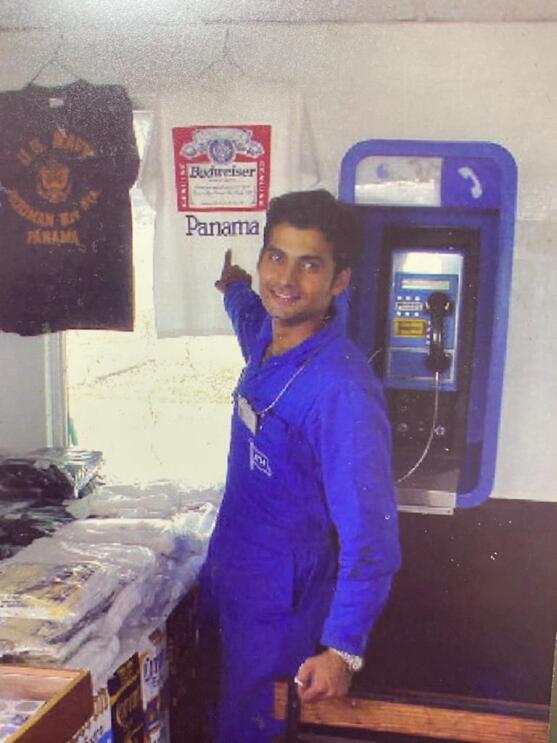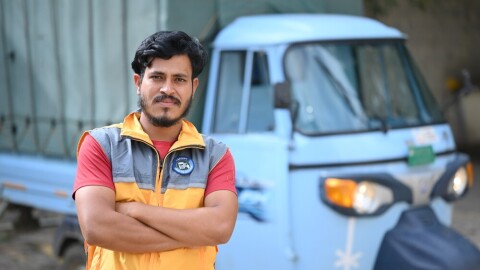From commanding ships across the globe to leading some of Amazon India’s key Operations teams to driving the Vaccination Task Force (VTF) for Amazon India, Abhinav Singh, Director – Amazon India, is full of interesting stories, experiences, and learnings. Abhinav joined Amazon over 9 years ago and since then, he has been a key contributor to Amazon.in’s success journey and growth. He started as a Product Manager for an Operations technology project and
went on to lead Amazon Transportation Services, Amazon Logistics, and New Businesses for Amazon India Operations (INOPS). In this interview, we will get to hear about Abhinav’s time sailing, how the VTF was formed and helped 100k+ individuals get vaccinated in a month, his learnings over the years, his 3 best tips for success at Amazon and much more.
Abhinav, from sailing across the world to leading India Operations for Amazon… Tell us a bit about the transition.
I sailed on ships for 11 years, 10 of which I worked in gas ships carrying methane all over the world. These are big, 300 meter-long ships that carry about 270,000 tons (2.5 million kilos) of liquefied methane. By 2010, I was promoted to Captain, but 27 seemed too young an age to plateau. I had worked ashore for a couple of years in London, and it was a unique experience. So I decided to study MBA in the Indian School of Business, Hyderabad and give shore life a chance.
I had actually thought of going back to oil and gas when I joined ISB, “What’s the worst that can happen?" I thought. "I can always go back sailing if this doesn’t work out.”
It just so happened that Amazon India came for an on campus recruitment drive, and I got through. That was in 2012. I joined as part of the Pathways Program, which is a leadership development program in Operations. One week into the job, I was told, “The Amazon.in launch has been postponed by a year and we don’t have an operations role for you, but there’s a program management opportunity for a technology product. Would you like to do that?” It seemed like a good idea, so I said yes, and I’m glad I did. I learned so much because of saying yes. Now it’s been over 9 years. My sailing licenses have expired. I don’t think I’m going back to sailing anytime soon.
Did you have any experience in technology when you took on the role?

Absolutely not.
One of the phenomenal things about Amazon is that it’s one of the rare places where we hire smart people (even if I do say so myself) and give them tough problems to solve, not necessarily based on their educational background
"One of the phenomenal things about Amazon is that it’s one of the rare places where we hire smart people (even if I do say so myself) and give them tough problems to solve, not necessarily based on their educational background."
I’m very lucky to have been mentored by leaders who took a bet on me. I used to report to a software director and he was very kind to guide me and help me understand a lot about tech. And, of course, I spent an inordinate amount of time studying on weekends and at nights, asking seemingly dumb questions in meetings, and being very open to feedback, so that I could equip myself for the role at hand.
What have been some of your proudest moments as an Amazonian?
There have been many, but I’ll talk about my top two.
The first one that stands out certainly is being part of the Amazon.in launch team back in 2013. It’s something that I’m super proud of, that I was there when the first package was shipped out. And getting to witness the journey from that first package to millions of packages a day today has been an honor.
The other thing that stands out is recent. During wave 2 of the pandemic in India, I was so proud to be part of an organization that showed such empathy. Thousands of Amazonians across the country stood up to help colleagues and their family members. That was a phenomenal moment and something that I am super proud to have been part of.
In the recent past, you have led the Vaccination Task Force (VTF) to enable vaccination of Amazon India’s frontline associates, employees, and their families. Tell us a bit about the experience, and how the team managed to enable vaccination of 100k+ individuals in a month!
It started as a conversation in late April’21 when the Indian government announced that everyone above 18 years of age would be eligible for vaccination. Leadership offered me the opportunity to lead the effort, which was super exciting to me because it was a chance to work on a really noble cause. So I took it up.
I spent the first day drafting tenets for the Vaccination Task Force . I firmly believe that tenets are very strong mental models for the direction in which you want to go
“I spent the first day drafting tenets for the Vaccination Task Force . I firmly believe that tenets are very strong mental models for the direction in which you want to go.”
Once my leaders were aligned on the tenets, we moved on to building a cross-functional team with placeholders that would help achieve the desired goals. Then we sought nominations from business leaders for folks who would take up different responsibilities. That’s how the skeletal framework of the VTF came into place.
The first thing we did was define the mission – that within the first 90 days, we would make vaccination a ready choice for all eligible employees and their dependents. Honestly, when we started out, we had no idea how we were going to get access to the necessary vaccines because the supply situation in the country was uncertain, but we were firm on the way we wanted to approach it because we had tenets that we had iterated over time.
Coming to the 100k+ mark in a month, I would say that a lot of it is because of the super motivated, independent individuals who make up the VTF and also the support of various healthcare partners. Teams are going above and beyond in every possible way, and spending time outside of their day jobs to get stuff done.
What were some of the key Leadership Principles (LPs) you focused on as you led the Vaccination Task Force (VTF)?
The most important leadership principle in the VTF is Ownership – people putting their hand up to go the extra mile and not focusing only on the narrow definition of their function or role. I honestly don’t even know some of the day jobs that people in the VTF do. I know there’s someone in HR helping out with Corporate Internal Communications. I know that one of the CS Program Managers is also double-hatting as one of the analytics leaders. The entire VTF is like that. I’ve never had to ask twice who would like to take up some aspect of the task force. And I’ve also never had to worry about whether or not the work will get done.
The second most important leadership principle has been Bias for Action. There was a need to move fast. Access was scarce, cases were piling up, and people were anxious. It was important to build a scalable product here and now, and be able to vaccinate thousands of people so that we could protect them from getting infected when infection was spreading the most.
The third one was Insist on the Highest Standards. It was critically important to ensure that there was no compromise on safety, social distancing or compliance from a regulatory perspective. If you look at all the events, no matter how big or small the city, you will find standardization in the workflow, the right signage, the right number of volunteers, etc. The byproduct is feedback that the experience was frustration-free, but a lot of effort went into designing the execution workflow, ensuring that it’s signed off for every site by a central team, standardizing the layout, and so on.
In your opinion what has been your biggest success and biggest failure? What have you learned from them?

The most satisfying thing, if you ask me, has been the opportunity to lead the Vaccination Task Force (VTF), but I’d like to believe my biggest success is yet to come.
My biggest failure goes back to when I was working on ships. I was second-in-command on an LPG ship that was carrying quite a lot of propane. We were sending gas ashore to a city in Brazil. I wanted to break the record for the fastest discharge operation. And in doing so, I was knowingly being a little hasty and unsafe. Fortunately, my captain at the time saw that what I was doing wasn't right. He stepped in, stopped the operations, and made sure that we corrected the leak before proceeding. In making that decision, I risked not just the ship (which is obviously very flammable) but also half the city of Santos, which could have blown up if there happened to be a spark or fire on board.
What that taught me is that when we think of morality, it’s not always as straightforward and clear as not taking a bribe. That is an easy moral dilemma.
The harder decisions are the ability to sacrifice short-term gain to do the right thing, even if nobody knows about what you did. The tradeoff between the two is just not worth it. Doing the right thing should always be the winner
“The harder decisions are the ability to sacrifice short-term gain to do the right thing, even if nobody knows about what you did. The tradeoff between the two is just not worth it. Doing the right thing should always be the winner.”
What do you think are three essential qualities that every Amazonian should cultivate to be successful?
The first is an enterprise-first mindset, which is part of some of our leadership principles like Ownership and Earn Trust. The ability to put the organization before yourself or your function is super important if you want to lead needle-moving initiatives. You should be looking to solve problems for Amazon, and not just your function.
The second is the ability to work with cross-functional teams and influence without authority because with our size and structure, you will never control your own destiny end-to-end. There will always be dependencies on other teams.
The third is an ability to scale. As an org, you should just assume that whatever you’re doing today won’t cut it a year down the line, if you have not factored in scalability. The day you start, you should think about what happens when this scales 10x, and how will you be able to manage that.
What are your favorite things to do outside of work?
I love spending time with my wife and two kids. Apart from that, I love golf, restoring cars, and reading, in that order. I am currently restoring a 1952 Morris Minor. The project unfortunately got put on hold because of the pandemic, but I look forward to getting back on that when I'm able to.
What is your biggest pet peeve?
There isn’t a lot, but poor discipline in every shape and form tends to upset me – like not being punctual, or not doing what you say you’ll do. It could be my upbringing and background, perhaps, but I’m a little bit of stickler for discipline.












